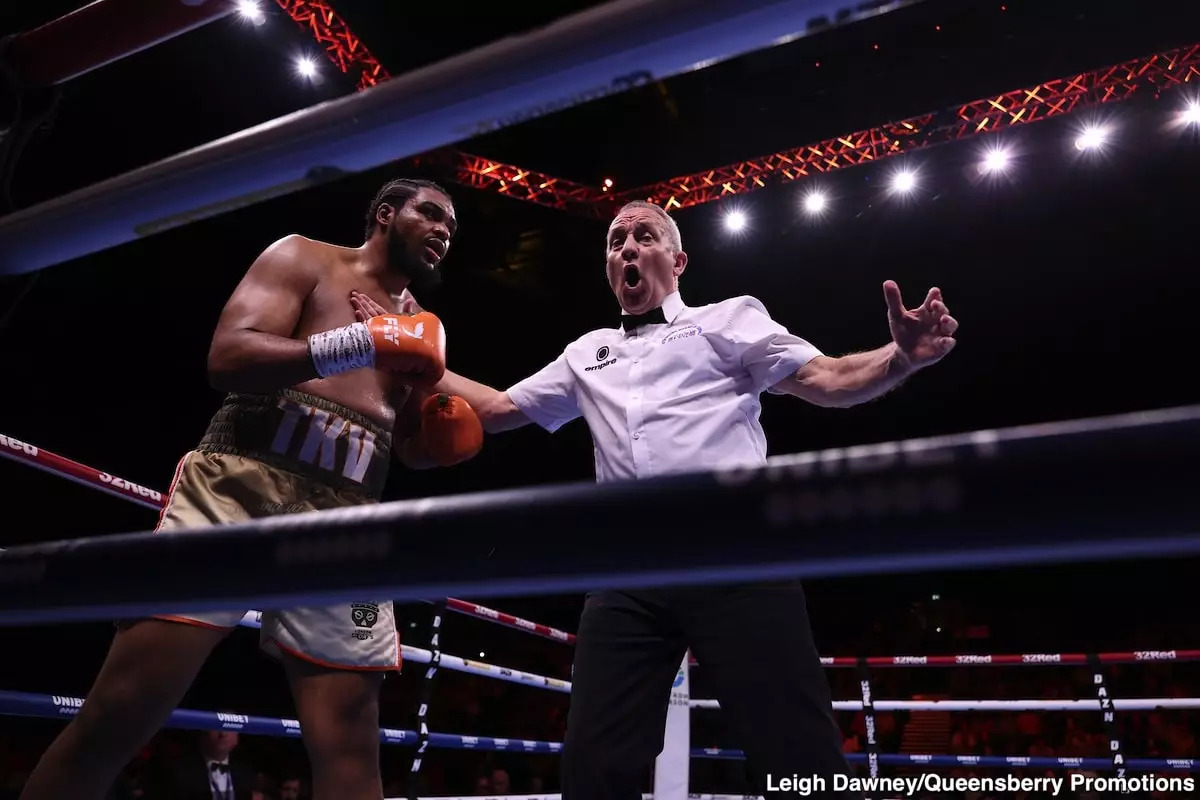Last night’s boxing card in Manchester was marked by excitement, anticipation, and ultimately, controversy. Fans gathered to witness the heavyweight showdown between Filip Hrgovic and Joe Joyce, yet the attention quickly shifted to a shocking incident in the co-main event featuring David Adeleye and Jeamie TKV—a match marred by what many perceive as one of the most egregious refereeing mistakes in recent memory. This match not only left allies and critics buzzing but also raised questions about the integrity of officiating in boxing, leaving a lingering sense of injustice in its wake.
As we delve into the sixth round of the encounter, tensions reached a boiling point when referee Ron Kearney intervened to break up the two fighters. It was then that Adeleye landed a vicious left hook squarely onto TKV’s jaw, sending him to the canvas. Referees calling “break” during a clinch is commonplace, but to throw a punch with clear intent right after such a command is where the lines of sportsmanship and legality blur. Analyzing the moment, one could argue that the referee’s actions set the stage for this catastrophic outcome; having called for a break multiple times, Kearney’s failure to maintain control allowed a cheap shot that would forever alter the landscape of the match.
Hot Takes: A Promoter’s Outrage
Ben Shalom, TKV’s promoter, captured the emotions of many as he expressed his outrage at the seemingly catastrophic officiating. Labeling the incident as one of the “most disgraceful” displays he’s witnessed in his career, Shalom’s comments carry weight, hinting at an ongoing crisis within the sport. “It has to be overturned,” he declared, insisting that the decision to count TKV out after such a blatant failure of referee oversight was unacceptable. His assertion that TKV was decisively “winning” the fight adds another layer to the discussion, suggesting the ramifications extend beyond just a single misjudgment—it strikes at the fair treatment and recognition of fighters’ abilities to succeed in the ring.
Shalom’s call for an official appeal underscores a broader concern in boxing: can the sport protect its athletes and maintain fairness when such pivotal errors go unaddressed? The British Boxing Board of Control now finds itself at a crossroads, faced with the responsibility of addressing Shalom’s grievances while evaluating whether a precedent has been set that could demand change. The mere question of whether this fight’s outcome will be reversed reveals the precarious nature of the sport’s regulatory structures, which are often criticized for their inconsistency.
The Need for Reform in Officiating
With the dust still settling over last night’s events, discussions surrounding reform in officiating have resurfaced. The question persists: how can we allow athletes to engage in such physically demanding contests if errors like these persist unchecked? The fight game deserves referees who are vigilant and have unquestionable authority in the ring. This incident not only highlights a disservice to fighters but also undermines the very essence of competitive sportsmanship that boxing espouses.
Moreover, the vitality of a rematch between Adeleye and TKV must be questioned. Would fans truly welcome a rehash of what many perceived as a poorly executed bout? Initially, expectations ran high, as boxing enthusiasts anticipated a thrilling face-off—yet, the real fight was largely uneventful until it spiraled into chaos. While TKV’s performance was respected, it raises a further dilemma: does he truly deserve a sequenced outing under the same contentious conditions, or is there a need for a fresh name to step forward against Adeleye?
Ultimately, this chaotic ending to what promised to be an engaging heavyweight bout goes beyond Adeleye and TKV. It touches on elements crucial to boxing’s integrity: fairness, respect, and athlete welfare. If a simple miscommunication can lead to a major fumble within the sport, it poses a challenge to all fighters who dare to enter the ring, wresting away their autonomy to dictate the course of their careers.
As the sport evolves, we must demand accountability—not only from fighters but also from those who control the environment in which they compete. Attention must gravitate towards the protocols governing officiating, creating an atmosphere that cultivates both competitive spirit and ethical conduct. Whether the British Boxing Board of Control will react decisively in the wake of this incident remains an open question, but what is undeniable is this: last night’s events must serve as a clarion call for change in the world of boxing.

